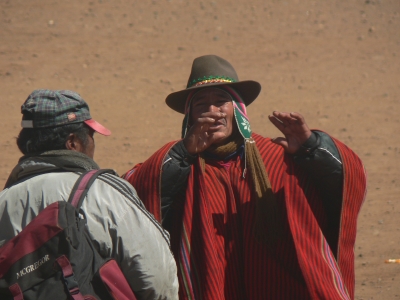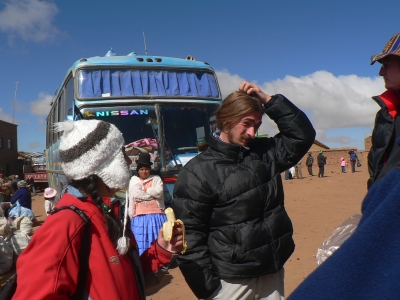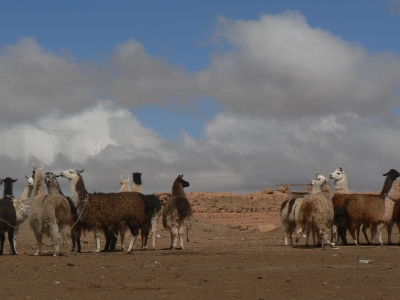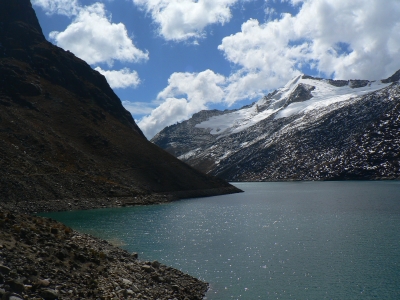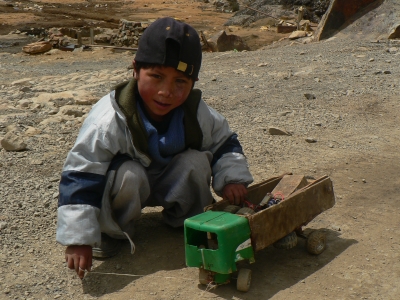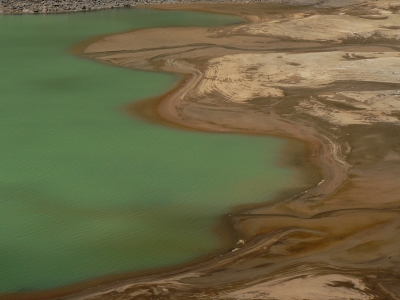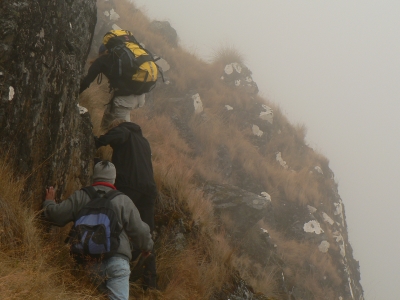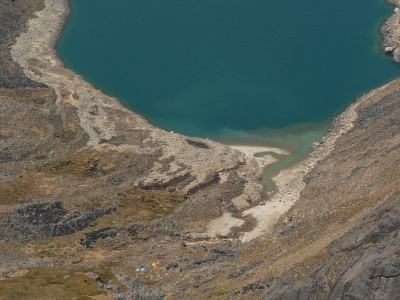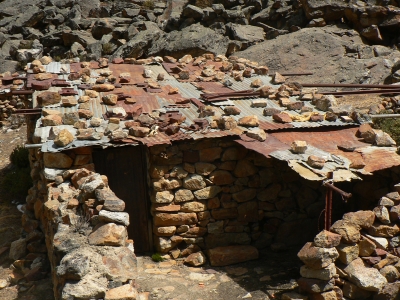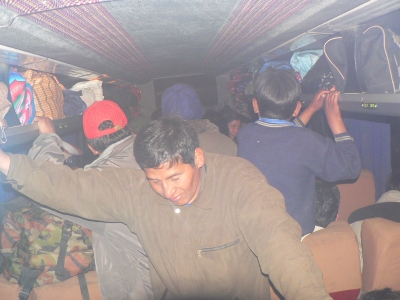|
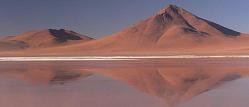 |
|
|
Travelog:
USA Nomads in America
Peru Void Touching
Bolivia
Walk the Rainbow Sweet Sucre Shamanic Verses Ever Upward Gettin' Home Rurrenabaque Chile Wheels of Jesus Valparaiso Argentina Waterfall Wonderland Buenos Aires Magic Boots The Fitz! The Fitz!! Dances w/ Bicycles 1 Dances w/ Bicycles 2 Brazil Inside the Toy Chest Moments from Rio The Island of Honey |
The Art of Getting Home
Aug 20th, 2006
Ever lusted after a choose-your-own-adventure moment? One cold night in a worsening snowstorm in Bolivia's Quimsa Cruz mountains, I had two options:
For the last week, I'd been traveling with a group of climbers, including our fearless leader Denys, a chica from La Paz who's writing a book on the region. Also on the trip: Maxi and Laura, an avid pair of Argentine climbers; Manuel, a physics student from La Paz, and Gringo, a tall, blond Frenchman studying in Argentina, but currently AWOL for Bolivian climbing. We'd packed food for 7 days, and for the last 3, had been camping beside a dazzling blue lake at 4800m (15,750 ft), between craggy mountains that were much taller. With rope for rock and ice, there were multiple expeditions running each day, and much tea consumed as the temps plummeted at night. Through Denys' connections, we scored free lodging for the first two nights, with 3-course meals! Our hosts ran a private hydroelectric power plants that harvest lakes over 3000ft above. The prosperous community, unlike many in Bolivia, has a beneficent paternal feel to it. After a grueling day hike in pea-soup fog, we returned and ended up playing walley ball with the employees of the plant -- one of the 4 sports courts on the premises. They were even nice enough to drop us off at the trailhead in a 4x4 the next day. But, as the prelude indicates, this story is all about getting out.. On the night of departure, with our choice made, we hopped into the puttering minibus.The driver accelerated, taking snowy turns at 20, 25, 30mph. When you can see nothing but blowing flakes and village lights 200ft below, this is a genuine concern. Still, better than shivering under a tin roof for a doubtful bus, so I gritted my teeth and Denys and I talked about her volunteer firefighting in Bolivia and Canada. Our minibus was speeding towards the town of Quime, where with luck we would find transport back to La Paz that night. It started optimistically enough. Opening the minibus door, the air at Quime's lower elevation was a balmy 50 deg F. Pulling at 10PM, Denys and I sprinted down the cobbled street to a waiting bus scheduled to leave for La Paz at 10:30PM. There was space. I ran back to collect the other four. By the time we returned, not only had the bus filled up every seat including the aisle, but the bus manager was refusing to sell us tickets, even at a higher price. No other buses were leaving that night, and one of our crew -- Gringo -- had to be in La Paz the next morning to begin a 4-day trip back to Southern Argentina. It was bad. There was yelling, and crossing of arms. At one point, we shoved Gringo onto the bus and pushed as the bursting public inside pushed back. But no luck. Just as futility dawned, we learned there was another set of bus companies down the road, with departures for La Paz. The group trotted further down the street. As we arrived at the new company, a bus pulled up. It was arriving from another town and was already mostly full. Realizing the stakes, our group formed a protective phalanx around the door, even before the bus pulled to a stop. The mining towns of Quimsa Cruz are underserved by public transport, to put it mildly, and we were surrounded by 30 other people clamoring for space *in the aisle*. Denys and Maxi shoved us on the bus and started rapid negotiation with the driver to load our huge packs. Manuel, Gringo, Laura and I all piled on. Every seat was full. Most of the aisle was already full with "Cholas" (Bolivian ladies in traditional dress of bowler hats, pleated skirts and at least a dozen other layers) sitting on their cargo wrapped in blankets. We crammed in where we could -- the 6 of us were spread throughout the bus in twos, with a collective total of about 5 square-feet of floor space. My feet were splayed around a blanket-wrapped load of oranges and the seated Chola owning them. Grabbing the railing of the overhead luggage rack was all I could do to avoid an overly personal greeting. I could wiggle my toes for circulation, but not much more. Manuel was sitting on the top of the seat adjacent to me, legs dangling down, without floor space at all. The journey would be 8 hours. We would pass through the 4500m (14,750ft) altiplano, with most of the windows partially open. The temperature would hover at or below freezing, and the windchill was too scary to think about. I seriously wondered if my feet and legs would make it -- we had hiked with full packs for 5 hours earlier that day. Each time the bus stopped, Gringo or Maxi jumped out the window to check that our bags were safe. Bolivian night buses are notorious for bags being borrowed from the compartments. No less than 3 times, they popped out the windows into the dark to patrol the compartments. For the first two hours, we didn't talk much. Manuel and I were packed so tightly that his arm hung over my shoulder. I could feel the blood filling my feet, and the laced boots cutting into my ankle. We had nothing left to do but laugh at our own suffering. Then the trip began to get ridiculous... A boy started doing laps on top of the seatbacks, walking all the way from the front of the bus to the rear, and then skirting back up the other side. People in the aisle began to moan. Gringo, to our rear, announced that the "bus had to stop". We passed the message up, but the driver paid no heed. We tried again, but no response. Suddenly, to my left, Gringo (a 6'4" blond Frenchman in huge mountaineering boots) was walking on the seatbacks, as the 10 year-old had before him. He walked up to the front of the bus and personally requested a stop. Clearly, this was serious. They continued to ignore him until the bus hit a security checkpoint 15 minutes later. Gringo opened a window and jumped out. The bus erupted with shouts (mostly our group), "a person has left the bus! wait! Turista afuera!!" After finishing their documentation, the bastards driving the box of a human sardines started to pull away. Gringo, finished with gastrointestinal business, was on his way back to the bus and began to run after it. "Stop! There's a person behind!!" I can't be sure if Gringo caught the bus before or after it stopped, but I watched as he hauled himself back through the window, over two Bolivians, and took up roost on a seatback. After the bus stopped for a short break, Gringo and Laura encamped in two seats in the rear, and refused to move, claiming Denys had the tickets. A man who'd purchased the ticket flatly called Laura a liar, but she refused to move. Instead, he stood near me, nodding asleep (into my shoulder for 45 minutes). The man probably had the worst breath I've ever smelled. It was like death and like sour cheese. He was less than 3 inches from me for the next four hours. The bus sped on, and the temperature dropped. I had on every shred of clothing, but was still shivering. At one point I fell asleep and woke up with frozen saliva on my lip. Eventually, I was able to sit on the floor, and fell asleep there between bumpy stops. Manuel lost feeling in his leg for 3 hours. Eventually, Denys called back from the front of the bus. She gestured to lights on the horizon.. La Paz was near, as was the end of the trip. We were gleeful. As the bus pulled into the city, the cholas emptied the bus, taking their oranges with them. The aisle was free. Then seats. Then the whole bus. We reached the terminal and just laughed and laughed.. |
Snaps:
(All Bolivia)
|
.gif)
